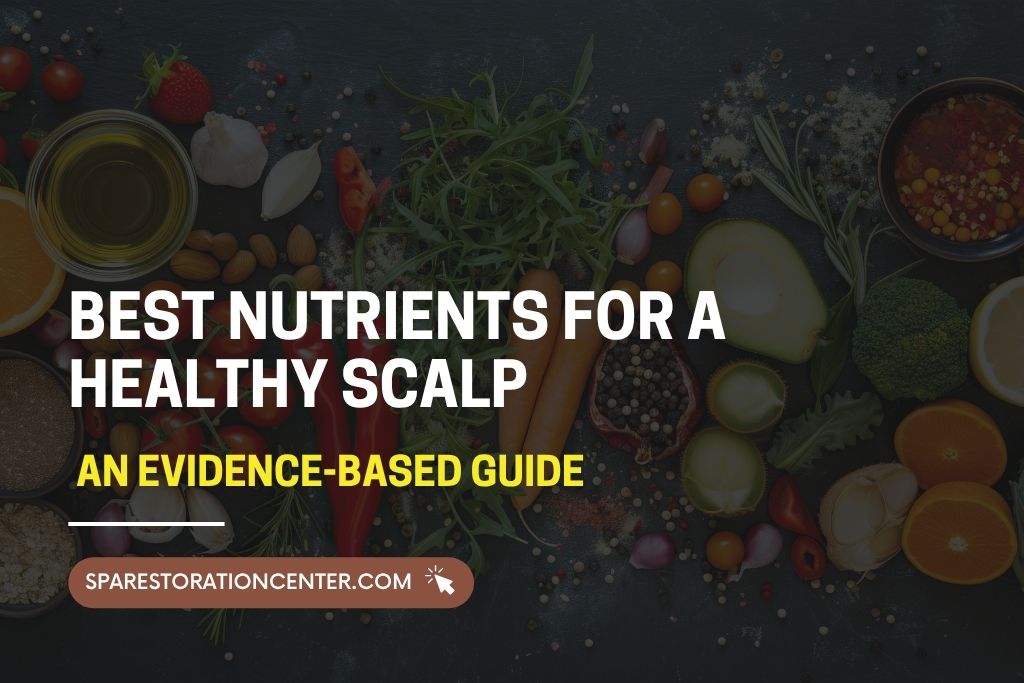
Best Nutrients for a Healthy Scalp: An Evidence-Based Guide
Want stronger, healthier hair? Hair treatments can help, but real growth starts from within. Feeding your scalp the right nutrients prevents problems like:
- Dryness
- Flakiness
- Thinning
Certain nutrients are essential for healthy hair:
- Vitamins: Boost hair growth and control oil production
- Minerals: Strengthen hair from the inside out
- Proteins and fatty acids: Build and maintain healthy strands
Changing your diet can fix many common hair issues. By knowing which nutrients support hair follicles, you can plan meals that actually improve your hair.
This guide will show you how to:
- Identify the most important vitamins and minerals for hair
- Understand how a balanced diet affects hair growth
- Choose foods that keep your scalp and hair healthy
With the right nutrients, your scalp stays healthy, and your hair looks stronger and fuller.
What Are the Key Nutrients for a Healthy Scalp?
The condition of your scalp shows how healthy your body is.
Eating a balanced diet with the right vitamins, minerals, and nutrients gives your hair follicles what they need.
These nutrients help your hair grow strong. They also regulate oil production and protect your scalp from damage.
Focusing on good nutrition is an easy way to support healthy hair.
Vitamins for Scalp Health
Vitamins are essential for cell growth and hair cycles. They help produce sebum to moisturize your scalp and protect follicles from damage. Missing key vitamins can cause:
- Dryness
- Hair shedding
- Slow growth
Important vitamins include:
- Vitamin A: Supports sebum production
- B-Vitamins (Biotin/B7): Essential for keratin production
- Vitamin C: Antioxidant that helps make collagen
- Vitamin D: Supports new follicle creation
- Vitamin E: Protects scalp from oxidative stress
A diet rich in these vitamins keeps your scalp healthy and creates the best environment for hair growth.
Vitamins for Scalp Health
Vitamins are essential for cell growth and hair cycles. They help produce sebum to moisturize your scalp and protect follicles from damage. Missing key vitamins can cause:
- Dryness
- Hair shedding
- Slow growth
Important vitamins include:
- Vitamin A: Supports sebum production
- B-Vitamins (Biotin/B7): Essential for keratin production
- Vitamin C: Antioxidant that helps make collagen
- Vitamin D: Supports new follicle creation
- Vitamin E: Protects scalp from oxidative stress
A diet rich in these vitamins keeps your scalp healthy and creates the best environment for hair growth.
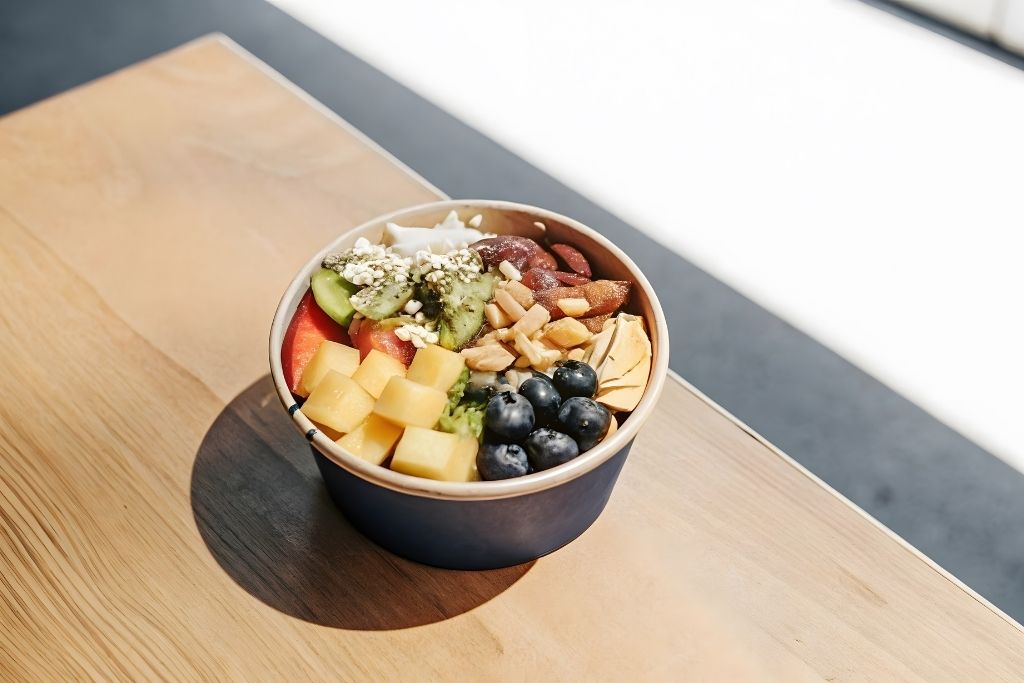
Essential Minerals for Hair Growth
Minerals help build strong hair and support the growth cycle. Lack of minerals can lead to thinning and hair loss. Key minerals include:
- Iron: Prevents anemia, which can cause hair loss
- Zinc: Helps hair tissue grow and repair
- Selenium: Protects the scalp from damage
Eating mineral-rich foods strengthens hair from the root, reduces breakage, and supports consistent growth.
Proteins and Fatty Acids
Hair is made mostly of keratin, a protein. Without enough protein, hair becomes weak and brittle. Fatty acids are also important, nourish the scalp and reduce inflammation.
- Protein: Builds hair structure
- Omega-3 Fatty Acids: Reduce inflammation and feed follicles
- Omega-6 Fatty Acids: Support overall scalp health
Adequate protein and healthy fats are the foundation for strong, hydrated hair.
Antioxidants
Antioxidants protect scalp cells and hair follicles from damage caused by free radicals. This damage can lead to thinning and premature aging of hair.
Key antioxidants include:
- Flavonoids: Found in fruits and vegetables
- Polyphenols: Found in tea, berries, and nuts
- Vitamins C & E: Protect skin and scalp health
Antioxidants protect your scalp from damage and help your hair stay healthy and strong.
How Does a Healthy Diet Promote Hair Growth?
A healthy diet directly supports hair growth. Hair follicles are some of the most active cells in the body, and they need a constant supply of calories, vitamins, and minerals to function.
The right nutrients give your scalp the building blocks it needs to produce keratin and divide cells at the base of each follicle. With proper nutrition, hair follicles can stay in the anagen (growth) phase longer.
A balanced diet also improves blood flow, delivering oxygen and nutrients to the hair roots. This creates the ideal environment for strong, healthy hair and can reduce hair shedding.
Can Nutritional Deficiencies Cause Scalp and Hair Problems?
Yes. Nutritional deficiencies are a major cause of scalp and hair issues, including hair thinning and hair loss.
Hair is a non-essential tissue, so when the body lacks nutrients, it prioritizes vital organs over hair follicles. This can push hair into the telogen (shedding) phase earlier than normal.
Common problems linked to poor nutrition include:
- Iron-deficiency anemia: Causes widespread hair loss
- Zinc deficiency: Leads to a dry, flaky scalp and shedding hair
- Low protein intake: Produces weak, brittle hair that breaks easily
- Biotin deficiency: Rare, but can cause hair thinning
Fixing these deficiencies with a healthy, targeted diet is often the first step to restoring scalp health and normal hair growth.
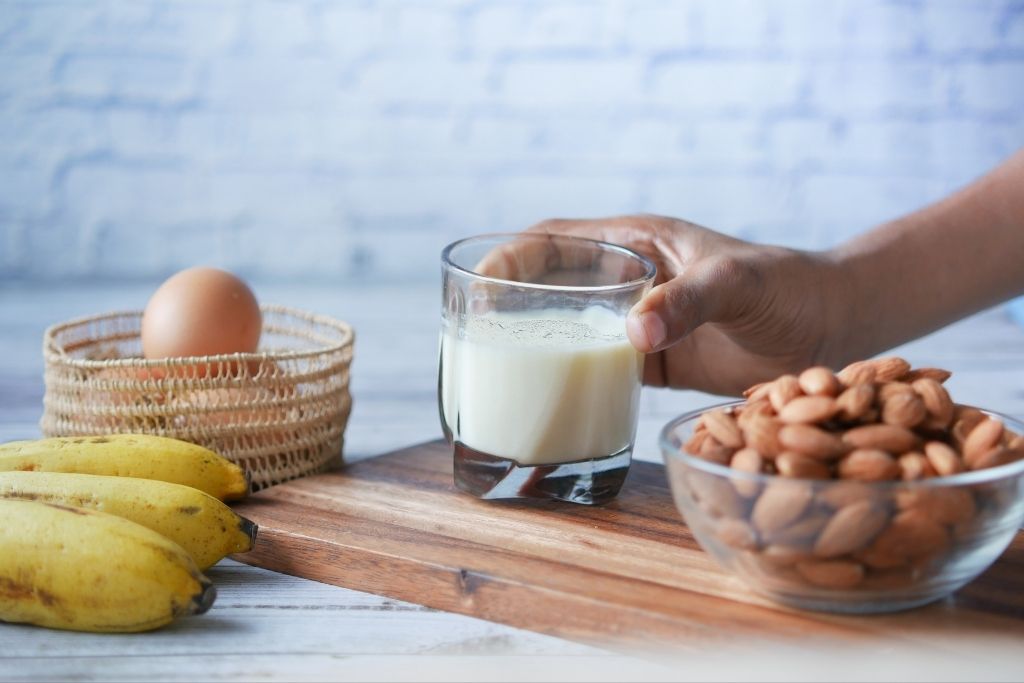
What Foods Should You Include for Optimal Scalp Health?
Eating the right foods gives your scalp the nutrients it needs for healthy hair growth. Include these in your diet:
- Lean proteins: Chicken, fish, eggs, and beans strengthen hair strands
- Iron-rich foods: Spinach, lentils, and red meat prevent hair loss from anemia
- Zinc sources: Nuts, seeds, and whole grains support a healthy scalp
- Omega-3 fatty acids: Salmon, walnuts, and flaxseed keep hair shiny and scalp moisturized
- Vitamins A and C: Carrots, sweet potatoes, oranges, and berries help hair grow and repair
- Biotin-rich foods: Eggs, almonds, and avocado strengthen hair and reduce breakage
A balanced diet with these nutrients helps prevent dryness, breakage, and hair thinning, keeping your scalp and hair healthy.
How Can You Maintain Scalp Health Alongside a Healthy Diet?
Scalp health starts from within, but combining a healthy diet with proper hair care keeps your scalp clean, balanced, and free from irritation that can slow hair growth.
Try these practices:
- Gentle Cleansing: Use a sulfate-free shampoo to clean without stripping natural oils.
- Scalp Massage: Massaging the scalp boosts circulation, helping nutrients reach hair follicles.
- Avoid Harsh Chemicals: Limit styling products, dyes, and treatments that irritate the scalp.
- Stay Hydrated: Drink plenty of water to support your skin and scalp health.
Pairing these habits with a nutrient-rich diet creates a complete strategy for healthy hair and a healthy scalp.
Take Control of Your Hair and Scalp Health
Healthy hair starts from the inside. Eating the right foods and getting enough vitamins, minerals, protein, and healthy fats gives your hair the nutrients it needs to grow strong.
Combine this with good scalp care:
- Wash gently with a mild shampoo
- Massage your scalp to improve blood flow
- Avoid harsh chemicals and dyes
- Drink plenty of water
Small changes add up. By feeding your body and taking care of your scalp, your hair will become stronger, shinier, and healthier. Your hair shows how healthy your body is, start caring for it today!
Frequently Asked Questions
1. Can taking supplements improve scalp health and hair growth?
Supplements can help, especially if you have a nutritional deficiency. But it’s best to get nutrients from a balanced diet first. Talk to a doctor before starting supplements to make sure they are safe and helpful for you.
2. How long does it take for dietary changes to show results in hair growth?
Hair grows about half an inch per month. It usually takes 3–6 months to see noticeable changes from diet. Consistency is important because hair follicles need a steady supply of nutrients.
3. Are there specific nutrients that help with dandruff and dry scalp?
Yes. Zinc and B-vitamins help control oil production and reduce flakiness. Omega-3 fatty acids keep the scalp moisturized and reduce inflammation.
4. Can too much of certain vitamins or minerals harm hair?
Yes. Too much Vitamin A or selenium can be toxic and may cause hair loss. Stick to recommended daily amounts unless a doctor tells you otherwise. Balance is key for scalp health.
5. Is a plant-based diet good for scalp health?
Yes. A well-planned plant-based diet can support a healthy scalp because it is rich in vitamins, minerals, and antioxidants. Make sure to get enough iron, zinc, and B12, which are important for hair growth.
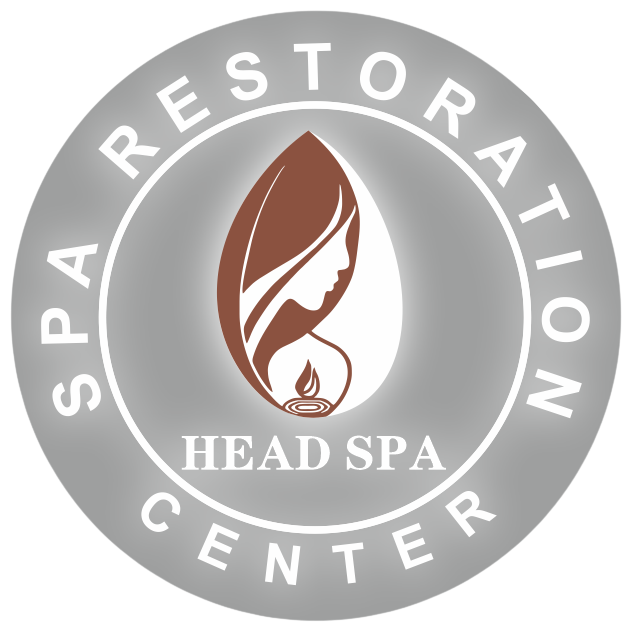
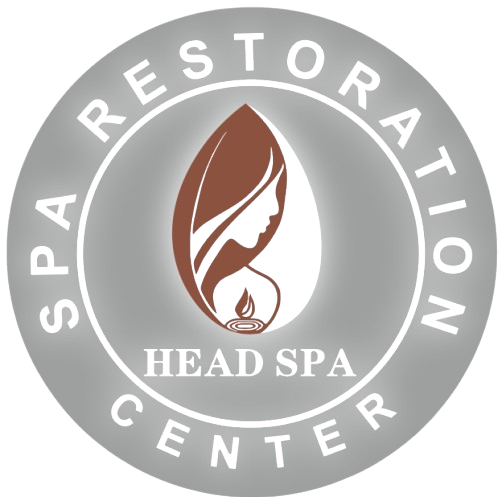
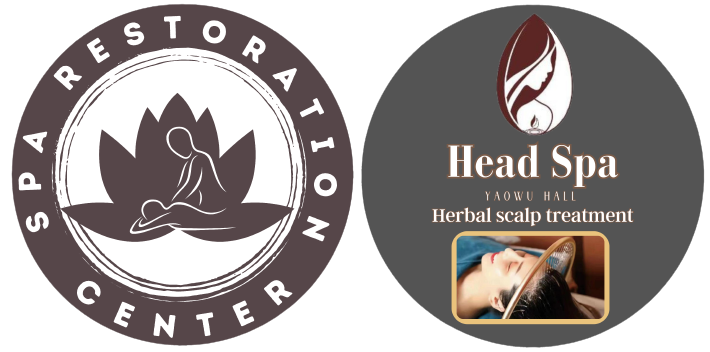
Leave a comment